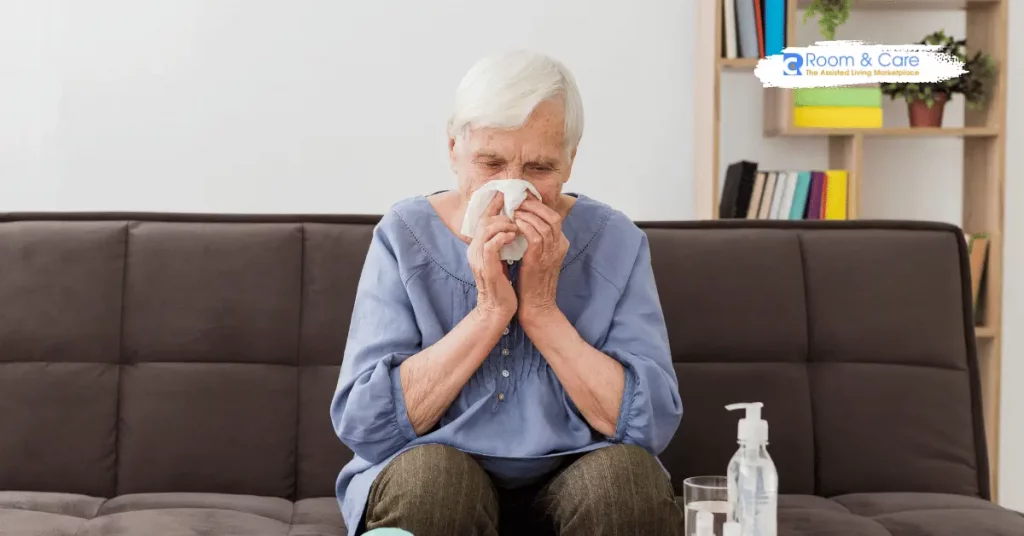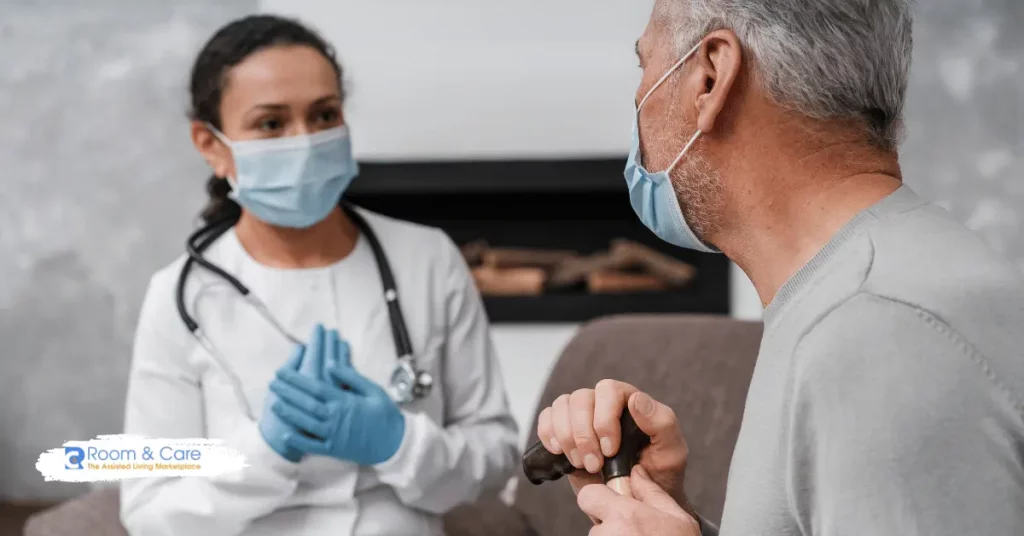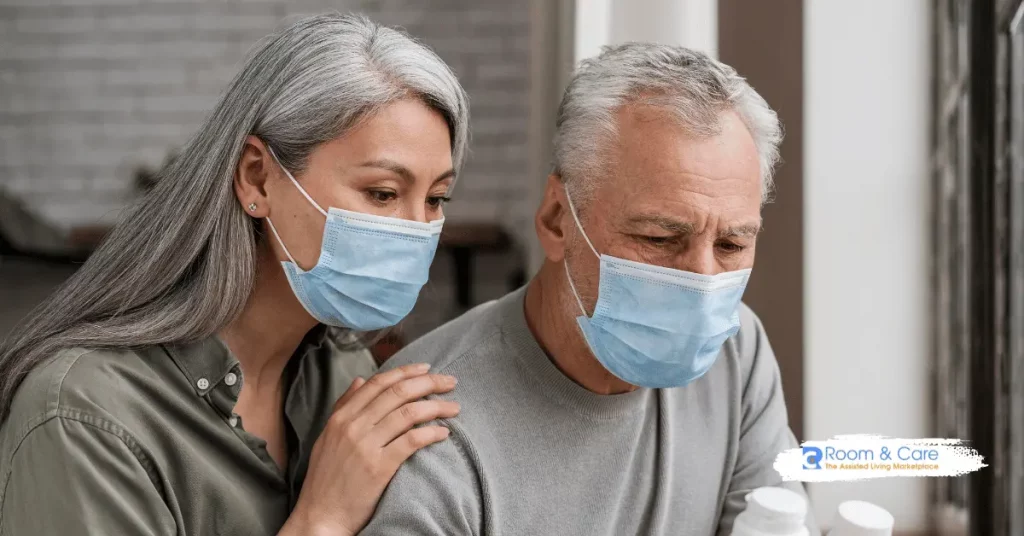

As people age, their bodies become more vulnerable to various health challenges, including infections. Common infections in elderly individuals can lead to serious health complications if not promptly identified and treated. This is particularly true for those living in senior communities such as assisted living facilities, nursing homes, or adult family homes, where close living quarters and shared amenities can facilitate the spread of infectious diseases.
In this article, we will explore the most common infections affecting elderly individuals, provide practical tips for prevention and management, and highlight what to consider when choosing a senior living community to ensure the safety and well-being of your loved one. We’ll also answer frequently asked questions and offer guidance on how Room and Care can help you find the right senior living facility without any referral fees or middlemen.
Aging brings about several physiological changes that affect the immune system. As people age, their immune response weakens, a phenomenon known as immunosenescence. This reduced immunity, coupled with the presence of chronic conditions such as diabetes, heart disease, or respiratory issues, makes older adults more susceptible to infections. In addition, elderly individuals in senior living communities are often exposed to shared spaces and close contact with others, increasing the risk of contagious diseases.
The high prevalence of infections among elderly populations underscores the importance of understanding the types of infections that are most common, how they present, and the best strategies to prevent and manage them effectively.
Urinary tract infections are among the most common infections in elderly individuals, especially women. In seniors, symptoms of UTIs can be atypical, such as confusion, sudden changes in behavior, lethargy, or falls, rather than the usual burning sensation during urination or frequent urination. This can delay diagnosis and lead to complications, including kidney infections or sepsis.
Prevention and Management:
Respiratory infections, including influenza and pneumonia, are highly prevalent and potentially life-threatening for elderly individuals. Chronic conditions like asthma, COPD, and heart disease can further increase the risk of severe respiratory infections. Outbreaks in senior living communities are common due to close living conditions.
Prevention and Management:
Skin infections, such as cellulitis and pressure ulcers (bedsores), are common in elderly populations. Thinner skin, reduced blood circulation, and limited mobility contribute to the risk of skin infections. Infections can develop quickly and require immediate medical attention to avoid complications.
Prevention and Management:
Gastrointestinal infections caused by viruses (like norovirus), bacteria (such as Salmonella), or parasites are common in elderly individuals, particularly in communal living settings. These infections can cause severe dehydration, which is dangerous for seniors.
Prevention and Management:

The COVID-19 pandemic has underscored the vulnerability of elderly individuals to viral infections. Similar viral infections, such as Respiratory Syncytial Virus (RSV), can cause severe complications in older adults. Senior living communities must be vigilant about infection control practices to prevent the spread of these viruses.
Prevention and Management:
When selecting a senior living community, consider the facility’s infection control protocols. Here are some key factors to keep in mind:
Review the community’s infection control measures. Are there regular health screenings for both residents and staff? What steps are in place to handle outbreaks? A facility should have clear guidelines and well-trained personnel to effectively manage and prevent infections.
Visit the facility to assess its cleanliness. Check if common areas are regularly cleaned and well-maintained. Cleanliness is a fundamental aspect of infection prevention in any senior living community.
Ensure that the staff is trained in infection control practices and can recognize early signs of infection. Look for communities with on-site medical personnel or partnerships with local healthcare providers to ensure prompt medical attention when needed.
Choose a facility that offers comprehensive health services, including regular health check-ups, vaccinations, and immediate access to medical care. Assisted living facilities and nursing homes should have robust health services as part of their care packages.
A good senior living community should offer flexible services tailored to individual needs. This includes dietary modifications, special hygiene requirements, or additional care for those with specific medical conditions.
Caring for elderly loved ones requires vigilance and proactive measures to prevent infections. Here are some practical tips for families:
Promote a balanced diet rich in fruits, vegetables, lean proteins, and whole grains to boost the immune system. Regular physical activity and sufficient sleep are equally important to maintain overall health and resilience against infections.
Encourage your loved ones to wash their hands frequently, maintain oral hygiene, and keep their living space clean. Remind them to use hand sanitizers, especially in public places.
Ensure your loved one receives all recommended vaccinations, including flu, pneumonia, and COVID-19 shots, to protect them against common infections.
Regular health check-ups can help identify infections early. Watch for any sudden changes in behavior, mood, or physical condition, which might indicate an underlying infection.
Educate both seniors and caregivers about the symptoms of common infections. Knowing what to look out for can lead to quicker detection and treatment, reducing the risk of complications.

1. What are the common symptoms of infections in the elderly?
Symptoms of infections in elderly individuals may differ from those in younger adults. Confusion, sudden changes in behavior, lethargy, and falls are often signs of infection in older adults. It’s essential to recognize these atypical symptoms for prompt diagnosis and treatment.
2. How can I choose the right senior living community for my loved one?
When selecting a senior living community, consider factors like infection control policies, staff training, cleanliness, and the availability of health services. It’s also important to choose a community that meets the specific needs of your loved one.
3. Why are seniors more prone to infections?
Seniors are more prone to infections due to weakened immune systems, existing chronic conditions, and, in some cases, limited mobility. These factors make it easier for infections to take hold and harder for the body to fight them off.
4. What should I do if my loved one shows signs of infection?
If your loved one exhibits signs of infection, such as confusion, fever, or sudden changes in behavior, seek medical attention immediately. Early intervention can prevent the infection from becoming more serious.
5. Are infections more common in senior living communities?
Yes, infections can be more common in senior living communities due to close living quarters, shared facilities, and frequent interaction among residents. However, facilities with strong infection control policies and practices can effectively manage and reduce the risk of infections.
Choosing the right senior living community is a significant decision that impacts your loved one’s health and quality of life. At Room and Care, we make this process easier by offering a comprehensive platform where you can find the best-assisted living facilities, adult family homes, memory care facilities, nursing homes, and independent living communities. Our user-friendly website allows you to filter for specific needs, to find the perfect fit for your loved one.
Common infections in elderly populations, such as UTIs, respiratory infections, skin infections, gastrointestinal infections, and viral infections, can have serious consequences if not properly managed. Preventing these infections requires a combination of healthy lifestyle choices, good hygiene, vaccinations, and regular health monitoring. When choosing a senior living community, prioritize facilities with strong infection control measures, trained staff, and comprehensive health services.
By making informed decisions and choosing the right support, you can provide your elderly loved one with the best possible care and protection against common infections, ensuring they enjoy a higher quality of life in their golden years.